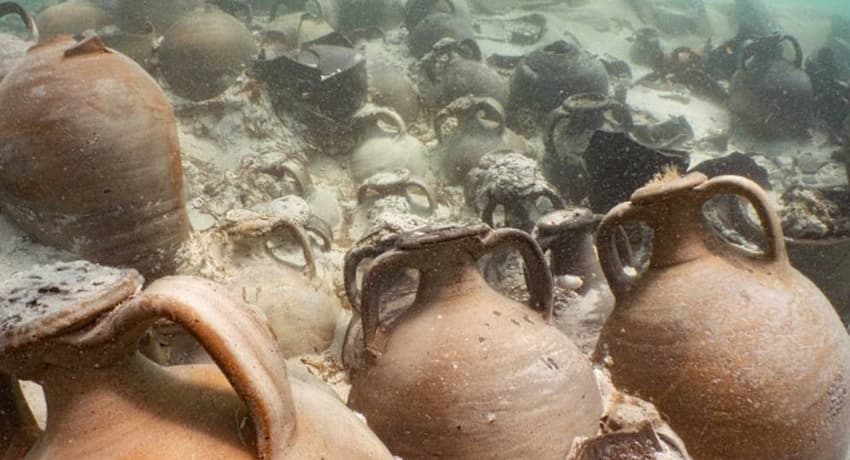Mallorca divers discover Roman shipwreck full of perfectly preserved jars of 1800-year-old ketchup

A sunken Roman ship dating from the 3rd century AD has been discovered virtually intact on the seabed off the coast of Mallorca.
The amazing discovery of the small vessel, thought to be en route from Spain to Rome when it sunk after running aground off the coast of the Balearic Island, has revealed a surprising treasure.
For contained within dozens of perfectly sealed earthenware amphorae were Roman delicacies of the day: olive oil, wine and garum, a sauce comparable to modern-day ketchup.
"Garum was the flavour of Rome – the Roman equivalent of tomato ketchup," explains chef Heston Blumenthal in his historical cooking show Heston's Roman Feast. "They were wild about this stuff and used it in 90 percent of recipes."
Made from fermented fish guts, wine, olive oil and spices, it was so popular that it was mass produced in Spain and shipped to Rome to be distributed across the empire.
The exciting find was made by a team of marine archaeologists from the Balearic Institute of Maritime Archaeology Studies who discovered the wreck and are in the process of recovering, documenting and analyzing its contents.
Es tracta de la primera excavació arqueològica subaquàtica a #Mallorca coordinada per un equip d'arqueòlegs balears. Pel que fa a l'arquitectura naval, aquest derelicte és un dels millors conservats de tota la Mediterrània del baix imperi. @ConsellMca @busquets_bel @kika_coll pic.twitter.com/WGfBDqCM8q
— CulturaMallorca (@culturamallorca) September 26, 2019
Experts believe that the great state of conservation of the vessel suggests that rather than being caught in a storm, which would have caused the contents of the ship to be scattered far and wide, the ship was sent to the depths of the sea after hitting a rock or running aground which caused it to quickly fill with water.
"In regards to naval architecture, this wreck is one of the best preserved in the entire Mediterranean of the lower Roman Empire," said the Department of Culture of Mallorca in a statement.
Segons les investigacions, el derelicte, datat de la segona meitat del segle III dC, transportava un carregament bastant heterogeni de productes com oli, vi i salses de peix. La nau hauria sortit d'algun port del sud de la península Ibèrica en direcció, molt probablement, a Roma pic.twitter.com/pjDIRVfTpy
— CulturaMallorca (@culturamallorca) September 26, 2019
The archaeological team praised the excellent condition of the amphorae – the traditional earthenware vases with a narrow neck and two handles – but added that the importance of the find was made even greater because they were able to recover their intact content.
RECOMMENDED READING:
Comments
See Also
The amazing discovery of the small vessel, thought to be en route from Spain to Rome when it sunk after running aground off the coast of the Balearic Island, has revealed a surprising treasure.
For contained within dozens of perfectly sealed earthenware amphorae were Roman delicacies of the day: olive oil, wine and garum, a sauce comparable to modern-day ketchup.
"Garum was the flavour of Rome – the Roman equivalent of tomato ketchup," explains chef Heston Blumenthal in his historical cooking show Heston's Roman Feast. "They were wild about this stuff and used it in 90 percent of recipes."
Made from fermented fish guts, wine, olive oil and spices, it was so popular that it was mass produced in Spain and shipped to Rome to be distributed across the empire.
The exciting find was made by a team of marine archaeologists from the Balearic Institute of Maritime Archaeology Studies who discovered the wreck and are in the process of recovering, documenting and analyzing its contents.
Es tracta de la primera excavació arqueològica subaquàtica a #Mallorca coordinada per un equip d'arqueòlegs balears. Pel que fa a l'arquitectura naval, aquest derelicte és un dels millors conservats de tota la Mediterrània del baix imperi. @ConsellMca @busquets_bel @kika_coll pic.twitter.com/WGfBDqCM8q
— CulturaMallorca (@culturamallorca) September 26, 2019
Experts believe that the great state of conservation of the vessel suggests that rather than being caught in a storm, which would have caused the contents of the ship to be scattered far and wide, the ship was sent to the depths of the sea after hitting a rock or running aground which caused it to quickly fill with water.
"In regards to naval architecture, this wreck is one of the best preserved in the entire Mediterranean of the lower Roman Empire," said the Department of Culture of Mallorca in a statement.
Segons les investigacions, el derelicte, datat de la segona meitat del segle III dC, transportava un carregament bastant heterogeni de productes com oli, vi i salses de peix. La nau hauria sortit d'algun port del sud de la península Ibèrica en direcció, molt probablement, a Roma pic.twitter.com/pjDIRVfTpy
— CulturaMallorca (@culturamallorca) September 26, 2019
The archaeological team praised the excellent condition of the amphorae – the traditional earthenware vases with a narrow neck and two handles – but added that the importance of the find was made even greater because they were able to recover their intact content.
RECOMMENDED READING:
Join the conversation in our comments section below. Share your own views and experience and if you have a question or suggestion for our journalists then email us at [email protected].
Please keep comments civil, constructive and on topic – and make sure to read our terms of use before getting involved.
Please log in here to leave a comment.